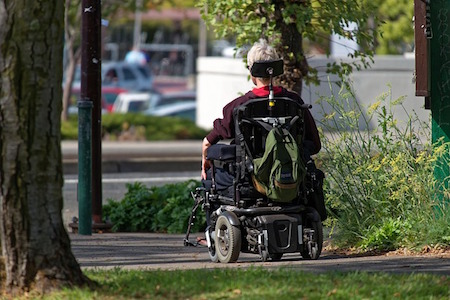Uber, Lyft And Transportation For People With Disabilities

In the past years, Uber and Lyft, which are transportation network companies, have been subject to several lawsuits across the country for failing to provide transportation for people with disabilities.
Just last month, 2 people in Jackson, Mississippi, sued Uber for not providing cars that are accessible to people with wheelchairs. In October 2016, Access Living of Metropolitan Chicago also sued Uber for not providing vehicles equipped to handle wheelchairs. Going back to 2014, Jennifer McPhail of Austin, Texas, sued Lyft for similar reasons. Wheelchairs are not the only issue, several people that ride with service animals have been denied service by both companies.
Public and private transportation providers are obliged to comply with the American American with Disabilities Act (ADA), that requires them to offer accessible transportation for people with disabilities. Uber argues that it is a technology company, not a transportation one, and because of that the company is not subject to the ADA regulations requiring to provide accessible vehicles or accommodations.
Amid all these legal disputes, there is a case that has already generated changes in Uber and Lyft’s policies. The National Federation of the Blind (NFB) brought lawsuits against both companies, Uber in 2014 and Lyft in 2015, where it asked the companies to ensure that their transportation providers do not discriminate against visually impaired riders who travel with service animals. Both lawsuits were settled last year.
In the case of Uber, the company agreed to:
- "Require that drivers provide equal service to people with disabilities who travel with service animals.
- Permanently remove drivers from the platform if Uber finds that the driver knowingly denied service to someone with a service animal because of their service animal. Drivers may not deny service because of allergies or fear of dogs.
- Permanently remove drivers who are alleged to have refused service more than once, regardless of their intent or knowledge, as long as the complaints are plausible.
- Notify new drivers and existing drivers of their obligations to serve people with service animals when they sign up, through the app, and via email reminders. Uber also includes an agreement to comply with these obligations in the driver contract.
- Require all drivers to read and correctly answer questions about service animal obligations in an interactive pop-up in the app.
- Respond to customer complaints about service animal discrimination in a timely manner, and notify customers about the outcome of Uber’s investigation into the incident, including whether the driver has been permanently removed from the system."
Under the settlement with Lyft, the company agreed to:
- Amend its policy regarding transportation of riders with service animals.
- End its business relationship with drivers who discriminate against riders with service animals.
- No to block future trip pairing between riders and drivers as a result of a rider submitting a service animal complaint.
- No to charge riders cleaning fees for shedding by service animals.
- Do a joint announcement, publicity and community education.
- Perform driver education.
- Improve its complaint procedures.
- Do rider education.

As a part of the settlements, both companies are obliged to monitor compliance of service. For this, they are working with the NFB, which is conducting nationwide testing to ensure that riders with service animals are neither denied transportation nor treated disrespectfully by Uber and Lyft.
If you are a person who travels via Uber or Lyft and uses a service animal, or who travels via Uber or Lyft with someone who has a service animal, you can be part of the test and help monitor compliance. You can participate by filling the online questionnaire, prepared by the NFB. Every time you take a ride on Uber or Lyft, provide your feedback, either positive or negative. You can also help promote the questionnaire with friends or colleagues that travel with service animals.
In addition to the NFB questionnaire, Uber and Lyft, are offering the following methods to file a complaint:
- Uber: Fill the “I want to report a service animal issue” form.
- Lyft: Call the Service Animal Hotline at 1-844-250-3174 or fill the “How can we help you?” form.
Having reached this point with Uber and Lyft has taken a lot of effort by many people. Help make this effort worthwhile. Do provide your feedback when you ride with them!
Sources:
- “Guide-Dog Users Combat Discrimination by Uber”. Disability Rights Advocates, 30 April 2016, org/case/national-federation-of-the-blind-of-california-et-al-v-uber-technologies-inc-et-al
- “Groundbreaking Settlement to End Discrimination Against Blind Uber Riders Who Use Guide Dogs.” NFB, 30 April 2016, nfb.org/groundbreaking-settlement-end-discrimination-against-blind-uber-riders-who-use-guide-dogs
- “Lyft and the National Federation of the Blind Announce Comprehensive Accessibility Improvements for Lyft Riders Who Travel with Service Animals.” NFB, 3 April 2017, nfb.org/lyft-and-national-federation-blind-announce-comprehensive-accessibility-improvements-lyft-riders-who
- NFB & Lyft settlement agreement and release. January 2017, nfb.org/images/nfb/documents/pdf/uber-and-lyft/final-lyft-settlement-agreement-and-addendum.pdf
- “Uber and Lyft Testing Program.” NFB, nfb.org/rideshare
- “Accessibility at Uber.” Uber, 4 April 2017, accessibility.uber.com
- “Lyft Partners with National Federation of the Blind.” Lyft Blog, 4 April 2017, blog.lyft.com/posts/lyft-partners-with-national-federation-of-the-blind
